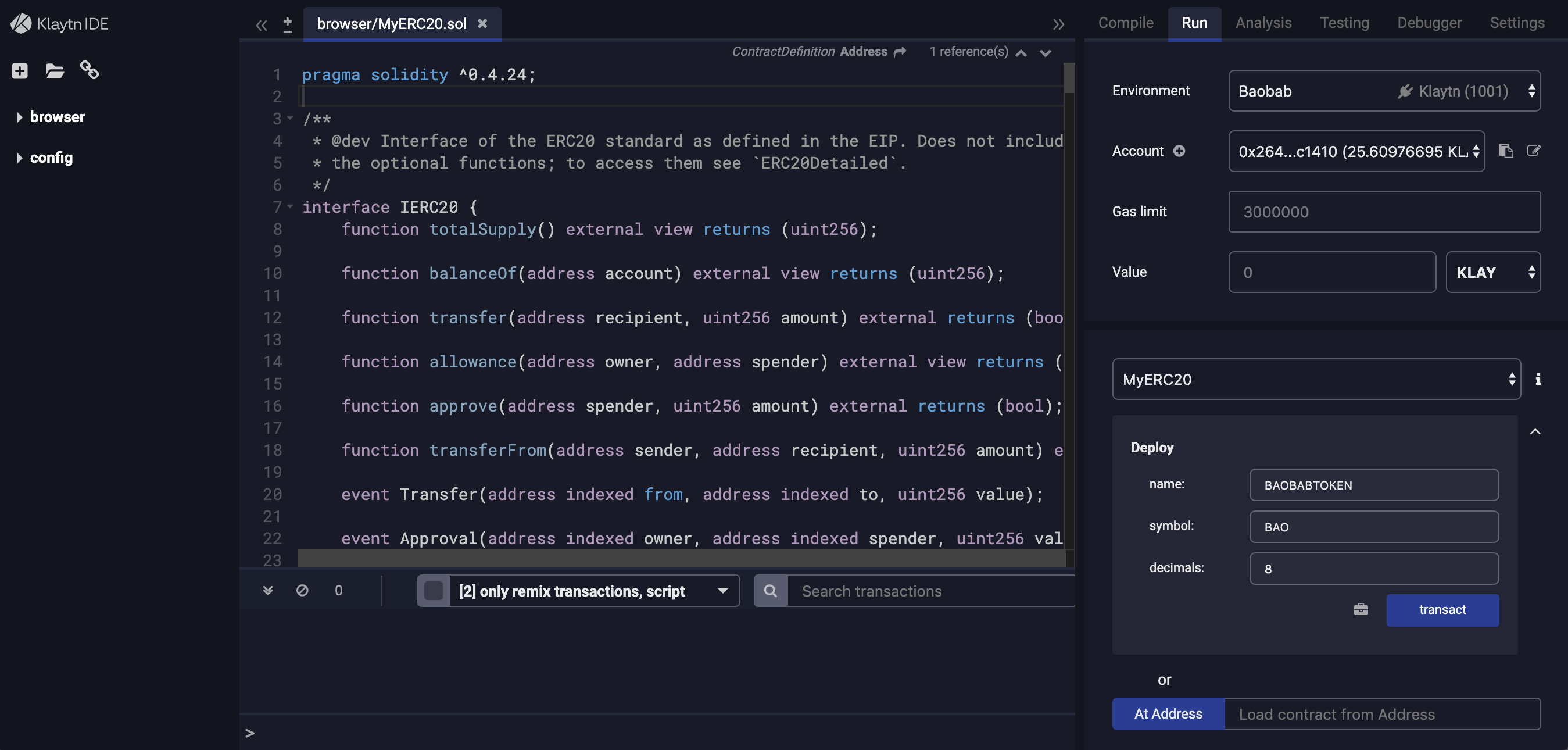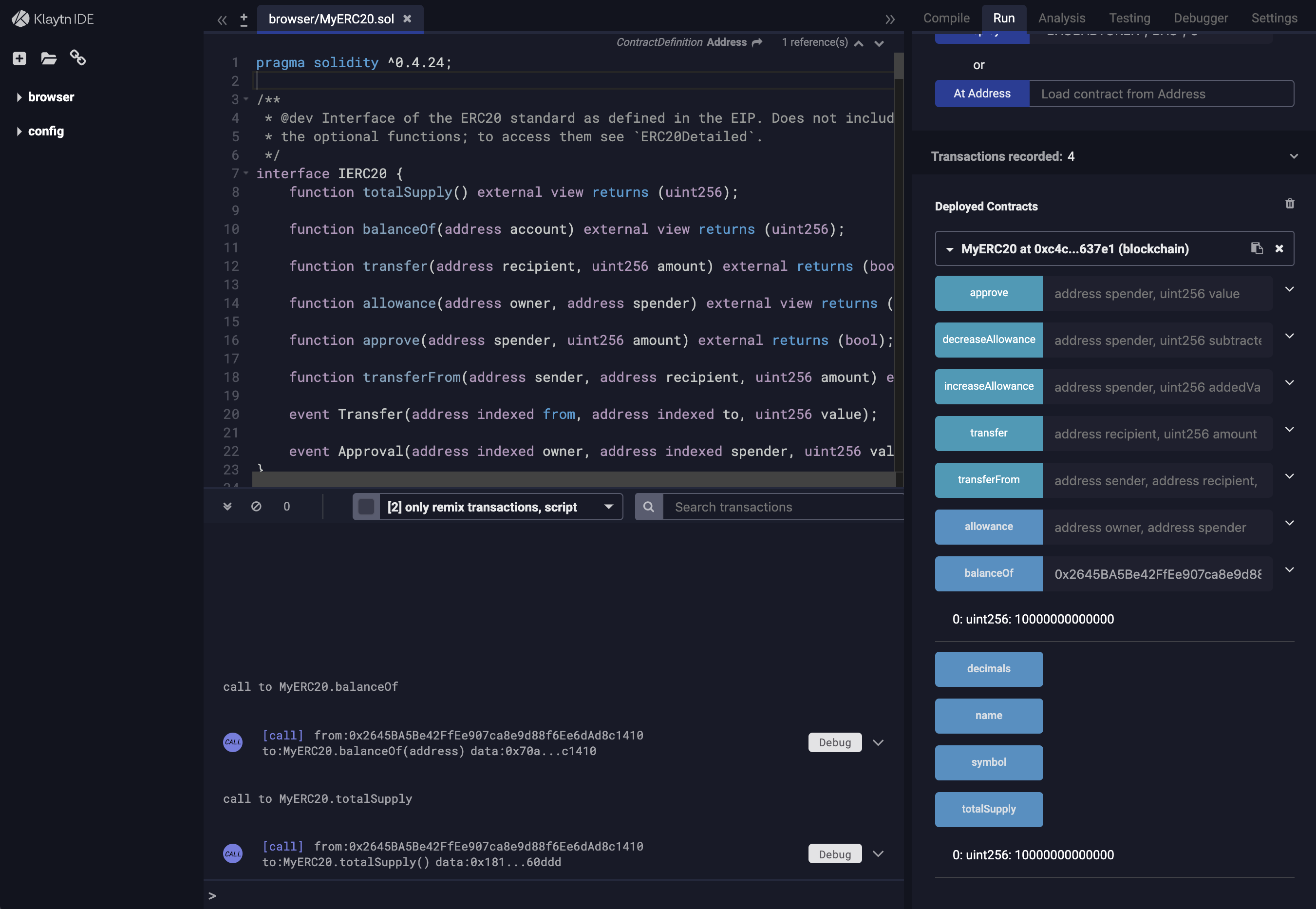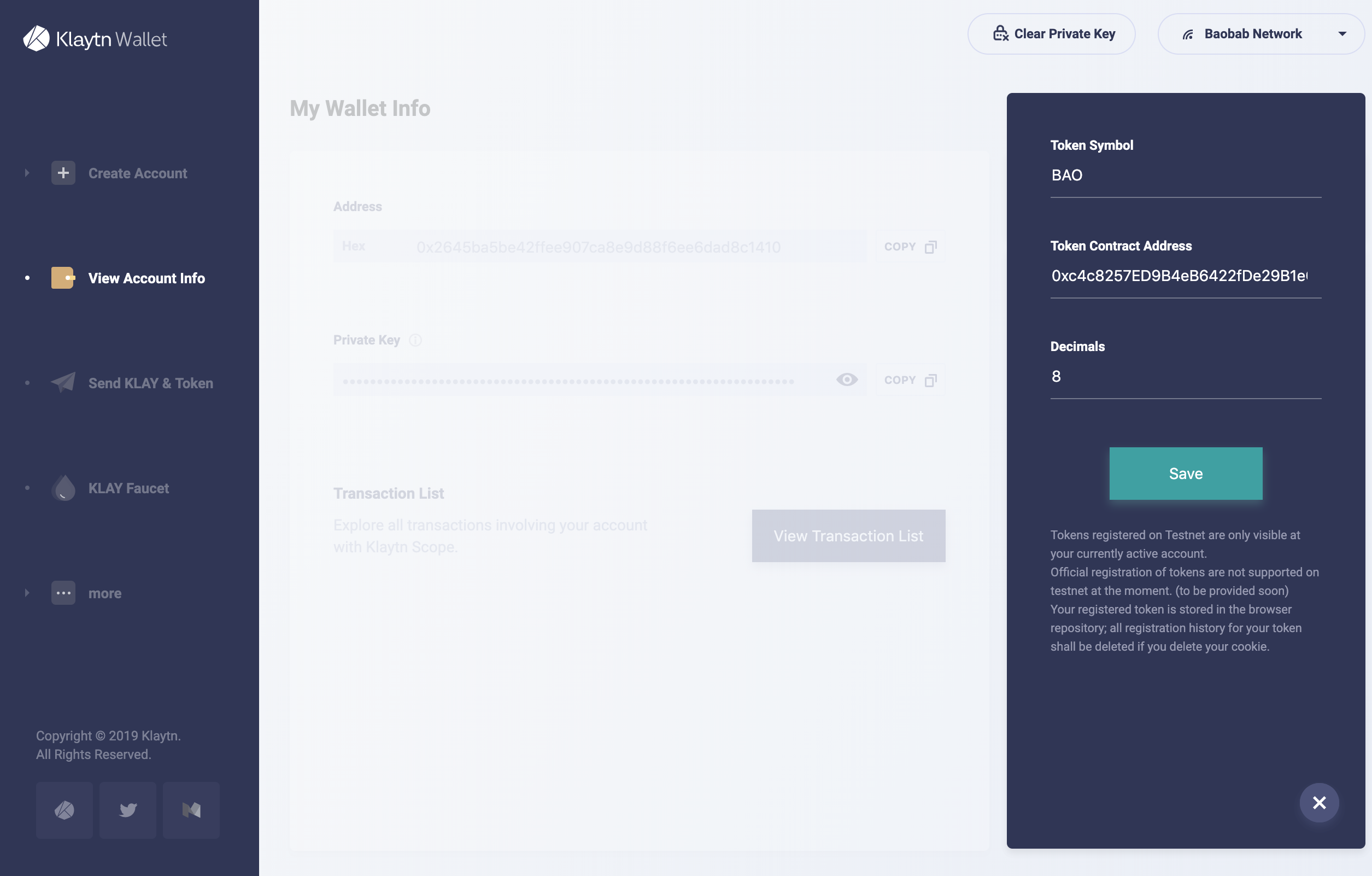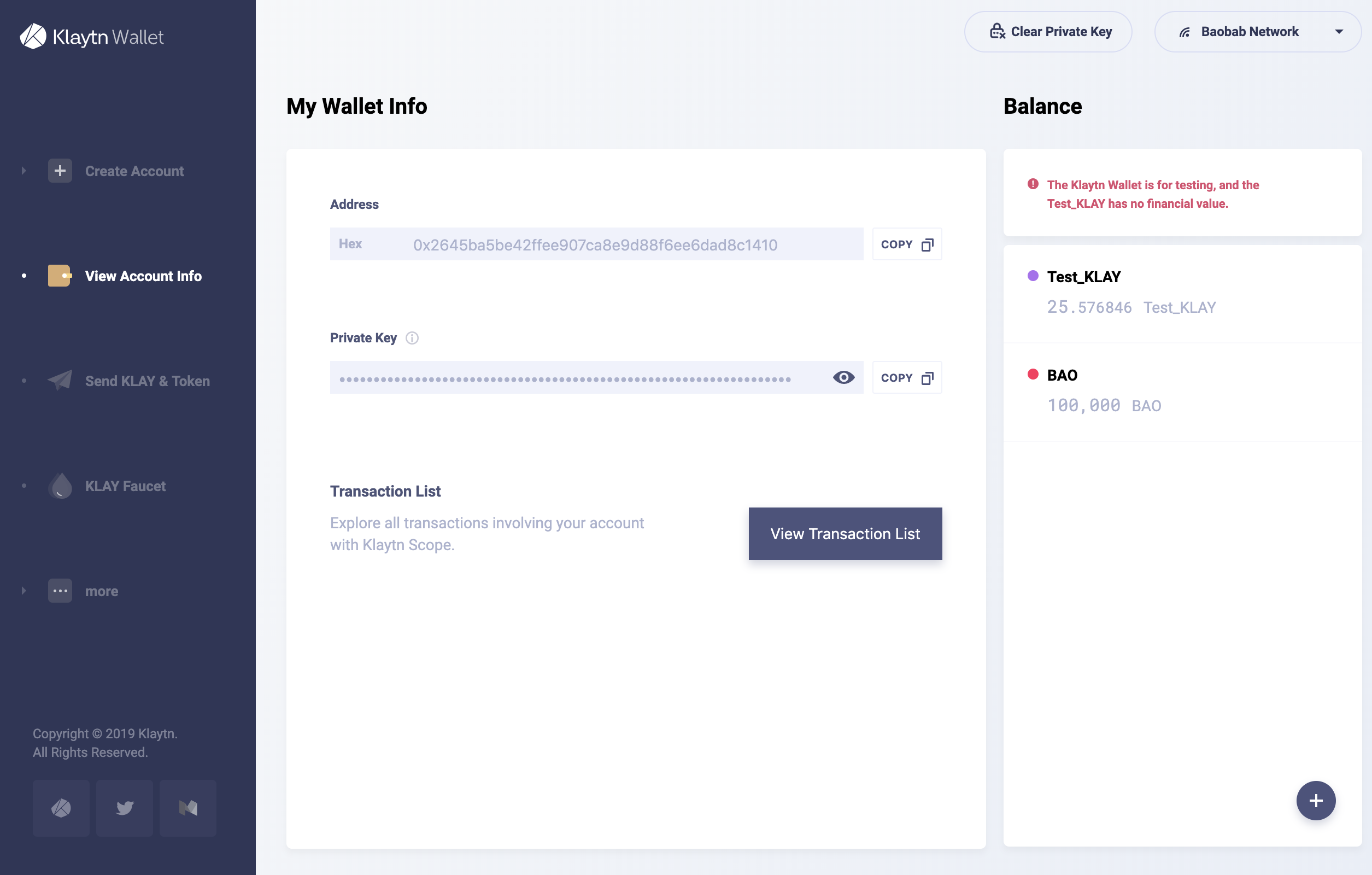ERC-20
Giới thiệu
Hướng dẫn này giúp bạn tạo một ví dụ về token tương thích với ERC-20, tuân thủ các Tiêu chuẩn token Klaytn, đặc biệt là Tiêu chuẩn token có thể thay thế (ERC-20).
Tiêu chuẩn token ERC-20 xác định hai sự kiện và 9 phương pháp (bao gồm 3 phương pháp tùy chọn) như sau. Các token tương thích với ERC-20 là các hợp đồng token triển khai giao diện sau đây.
function name() public view returns (string) //optionalfunction symbol() public view returns (string) //optionalfunction decimals() public view returns (uint8) //optionalfunction totalSupply() public view returns (uint256)function balanceOf(address _owner) public view returns (uint256 balance)function transfer(address _to, uint256 _value) public returns (bool success)function transferFrom(address _from, address _to, uint256 _value) public returns (bool success)function approve(address _spender, uint256 _value) public returns (bool success)function allowance(address _owner, address _spender) public view returns (uint256 remaining)event Transfer(address indexed _from, address indexed _to, uint256 _value)event Approval(address indexed _owner, address indexed _spender, uint256 _value)
Dựa trên giao diện trên đây, các nhà phát triển có thể tùy chỉnh token bằng cách thêm các tính năng và logic mới và triển khai trên mạng lưới Klaytn. Để biết thêm thông tin, hãy tham khảo tài liệu ERC-20 chính thức.
Trong hướng dẫn này, bạn sẽ triển khai MyERC20.sol, một token tương thích với ERC-20. Token này sẽ phát hành một số lượng token định trước và gửi tất cả các token đó cho chủ sở hữu hợp đồng khi triển khai.
MyERC20.sol được dựa trên việc triển khai ERC20 của OpenZeppelin. Phần lớn mã trong hướng dẫn này được phân nhánh từ OpenZeppelin 2.3 và các tập tin Solidity sau được sử dụng để triển khai MyERC20.sol.
- https://github.com/OpenZeppelin/openzeppelin-solidity/blob/v2.3.0/contracts/token/ERC20/IERC20.sol
- https://github.com/OpenZeppelin/openzeppelin-solidity/blob/v2.3.0/contracts/token/ERC20/ERC20.sol
- https://github.com/OpenZeppelin/openzeppelin-solidity/blob/v2.3.0/contracts/token/ERC20/ERC20Detailed.sol
- https://github.com/OpenZeppelin/openzeppelin-solidity/blob/v2.3.0/contracts/math/SafeMath.sol
1. Soạn hợp đồng thông minh ERC-20
1.1 Cấu trúc tổng thể của MyERC20
Dưới đây là mã nguồn đầy đủ của tập tin MyERC20.sol. Trong lần triển khai này, hàm constructor gọi _mint để tạo một số lượng token định trước khi triển khai hợp đồng.
pragma solidity ^0.5.0;/** * @dev Interface of the ERC20 standard as defined in the EIP. Does not include * the optional functions; to access them see `ERC20Detailed`. */interface IERC20 { function totalSupply() external view returns (uint256); function balanceOf(address account) external view returns (uint256); function transfer(address recipient, uint256 amount) external returns (bool); function allowance(address owner, address spender) external view returns (uint256); function approve(address spender, uint256 amount) external returns (bool); function transferFrom(address sender, address recipient, uint256 amount) external returns (bool); event Transfer(address indexed from, address indexed to, uint256 value); event Approval(address indexed owner, address indexed spender, uint256 value);}library SafeMath { /** * @dev Returns the addition of two unsigned integers, reverting on * overflow. * * Counterpart to Solidity's `+` operator. * * Requirements: * - Addition cannot overflow. */ function add(uint256 a, uint256 b) internal pure returns (uint256) { uint256 c = a + b; require(c >= a, "SafeMath: addition overflow"); return c; } /** * @dev Returns the subtraction of two unsigned integers, reverting on * overflow (when the result is negative). * * Counterpart to Solidity's `-` operator. * * Requirements: * - Subtraction cannot overflow. */ function sub(uint256 a, uint256 b) internal pure returns (uint256) { require(b <= a, "SafeMath: subtraction overflow"); uint256 c = a - b; return c; } /** * @dev Returns the multiplication of two unsigned integers, reverting on * overflow. * * Counterpart to Solidity's `*` operator. * * Requirements: * - Multiplication cannot overflow. */ function mul(uint256 a, uint256 b) internal pure returns (uint256) { // Gas optimization: this is cheaper than requiring 'a' not being zero, but the // benefit is lost if 'b' is also tested. // See: https://github.com/OpenZeppelin/openzeppelin-solidity/pull/522 if (a == 0) { return 0; } uint256 c = a * b; require(c / a == b, "SafeMath: multiplication overflow"); return c; } /** * @dev Returns the integer division of two unsigned integers. Reverts on * division by zero. The result is rounded towards zero. * * Counterpart to Solidity's `/` operator. Note: this function uses a * `revert` opcode (which leaves remaining gas untouched) while Solidity * uses an invalid opcode to revert (consuming all remaining gas). * * Requirements: * - The divisor cannot be zero. */ function div(uint256 a, uint256 b) internal pure returns (uint256) { // Solidity only automatically asserts when dividing by 0 require(b > 0, "SafeMath: division by zero"); uint256 c = a / b; // assert(a == b * c + a % b); // There is no case in which this doesn't hold return c; } /** * @dev Returns the remainder of dividing two unsigned integers. (unsigned integer modulo), * Reverts when dividing by zero. * * Counterpart to Solidity's `%` operator. This function uses a `revert` * opcode (which leaves remaining gas untouched) while Solidity uses an * invalid opcode to revert (consuming all remaining gas). * * Requirements: * - The divisor cannot be zero. */ function mod(uint256 a, uint256 b) internal pure returns (uint256) { require(b != 0, "SafeMath: modulo by zero"); return a % b; }}/** * @dev Implementation of the `IERC20` interface. * * This implementation is agnostic to the way tokens are created. This means * that a supply mechanism has to be added in a derived contract using `_mint`. * For a generic mechanism see `ERC20Mintable`. * * *For a detailed writeup see our guide [How to implement supply * mechanisms](https://forum.zeppelin.solutions/t/how-to-implement-erc20-supply-mechanisms/226).* * * We have followed general OpenZeppelin guidelines: functions revert instead * of returning `false` on failure. This behavior is nonetheless conventional * and does not conflict with the expectations of ERC20 applications. * * Additionally, an `Approval` event is emitted on calls to `transferFrom`. * This allows applications to reconstruct the allowance for all accounts just * by listening to said events. Other implementations of the EIP may not emit * these events, as it isn't required by the specification. * * Finally, the non-standard `decreaseAllowance` and `increaseAllowance` * functions have been added to mitigate the well-known issues around setting * allowances. See `IERC20.approve`. */contract MyERC20 is IERC20 { using SafeMath for uint256; mapping (address => uint256) private _balances; mapping (address => mapping (address => uint256)) private _allowances; // NOTE Start of https://github.com/OpenZeppelin/openzeppelin-solidity/blob/v2.3.0/contracts/token/ERC20/ERC20Detailed.sol string private _name; string private _symbol; uint8 private _decimals; constructor (string memory name, string memory symbol, uint8 decimals) public { _name = name; _symbol = symbol; _decimals = decimals; _mint(msg.sender, 100000 * 10 ** uint256(decimals)); // CAUTION! } /** * @dev Returns the name of the token. */ function name() public view returns (string memory) { return _name; } /** * @dev Returns the symbol of the token, usually a shorter version of the * name. */ function symbol() public view returns (string memory) { return _symbol; } /** * @dev Returns the number of decimals used to get its user representation. * For example, if `decimals` equals `2`, a balance of `505` tokens should * be displayed to a user as `5,05` (`505 / 10 ** 2`). * * Tokens usually opt for a value of 18, imitating the relationship between * Ether and Wei. * * > Note that this information is only used for _display_ purposes: it in * no way affects any of the arithmetic of the contract, including * `IERC20.balanceOf` and `IERC20.transfer`. */ function decimals() public view returns (uint8) { return _decimals; } // NOTE End of https://github.com/OpenZeppelin/openzeppelin-solidity/blob/v2.3.0/contracts/token/ERC20/ERC20Detailed.sol uint256 private _totalSupply; /** * @dev See `IERC20.totalSupply`. */ function totalSupply() public view returns (uint256) { return _totalSupply; } /** * @dev See `IERC20.balanceOf`. */ function balanceOf(address account) public view returns (uint256) { return _balances[account]; } /** * @dev See `IERC20.transfer`. * * Requirements: * * - `recipient` cannot be the zero address. * - the caller must have a balance of at least `amount`. */ function transfer(address recipient, uint256 amount) public returns (bool) { _transfer(msg.sender, recipient, amount); return true; } /** * @dev See `IERC20.allowance`. */ function allowance(address owner, address spender) public view returns (uint256) { return _allowances[owner][spender]; } /** * @dev See `IERC20.approve`. * * Requirements: * * - `spender` cannot be the zero address. */ function approve(address spender, uint256 value) public returns (bool) { _approve(msg.sender, spender, value); return true; } /** * @dev See `IERC20.transferFrom`. * * Emits an `Approval` event indicating the updated allowance. This is not * required by the EIP. See the note at the beginning of `ERC20`; * * Requirements: * - `sender` and `recipient` cannot be the zero address. * - `sender` must have a balance of at least `value`. * - the caller must have allowance for `sender`'s tokens of at least * `amount`. */ function transferFrom(address sender, address recipient, uint256 amount) public returns (bool) { _transfer(sender, recipient, amount); _approve(sender, msg.sender, _allowances[sender][msg.sender].sub(amount)); return true; } /** * @dev Atomically increases the allowance granted to `spender` by the caller. * * This is an alternative to `approve` that can be used as a mitigation for * problems described in `IERC20.approve`. * * Emits an `Approval` event indicating the updated allowance. * * Requirements: * * - `spender` cannot be the zero address. */ function increaseAllowance(address spender, uint256 addedValue) public returns (bool) { _approve(msg.sender, spender, _allowances[msg.sender][spender].add(addedValue)); return true; } /** * @dev Atomically decreases the allowance granted to `spender` by the caller. * * This is an alternative to `approve` that can be used as a mitigation for * problems described in `IERC20.approve`. * * Emits an `Approval` event indicating the updated allowance. * * Requirements: * * - `spender` cannot be the zero address. * - `spender` must have allowance for the caller of at least * `subtractedValue`. */ function decreaseAllowance(address spender, uint256 subtractedValue) public returns (bool) { _approve(msg.sender, spender, _allowances[msg.sender][spender].sub(subtractedValue)); return true; } /** * @dev Moves tokens `amount` from `sender` to `recipient`. * * This is internal function is equivalent to `transfer`, and can be used to * e.g. implement automatic token fees, slashing mechanisms, etc. * * Emits a `Transfer` event. * * Requirements: * * - `sender` cannot be the zero address. * - `recipient` cannot be the zero address. * - `sender` must have a balance of at least `amount`. */ function _transfer(address sender, address recipient, uint256 amount) internal { require(sender != address(0), "ERC20: transfer from the zero address"); require(recipient != address(0), "ERC20: transfer to the zero address"); _balances[sender] = _balances[sender].sub(amount); _balances[recipient] = _balances[recipient].add(amount); emit Transfer(sender, recipient, amount); } /** @dev Creates `amount` tokens and assigns them to `account`, increasing * the total supply. * * Emits a `Transfer` event with `from` set to the zero address. * * Requirements * * - `to` cannot be the zero address. */ function _mint(address account, uint256 amount) internal { require(account != address(0), "ERC20: mint to the zero address"); _totalSupply = _totalSupply.add(amount); _balances[account] = _balances[account].add(amount); emit Transfer(address(0), account, amount); } /** * @dev Destroys `amount` tokens from `account`, reducing the * total supply. * * Emits a `Transfer` event with `to` set to the zero address. * * Requirements * * - `account` cannot be the zero address. * - `account` must have at least `amount` tokens. */ function _burn(address account, uint256 value) internal { require(account != address(0), "ERC20: burn from the zero address"); _balances[account] = _balances[account].sub(value); _totalSupply = _totalSupply.sub(value); emit Transfer(account, address(0), value); } /** * @dev Sets `amount` as the allowance of `spender` over the `owner`s tokens. * * This is internal function is equivalent to `approve`, and can be used to * e.g. set automatic allowances for certain subsystems, etc. * * Emits an `Approval` event. * * Requirements: * * - `owner` cannot be the zero address. * - `spender` cannot be the zero address. */ function _approve(address owner, address spender, uint256 value) internal { require(owner != address(0), "ERC20: approve from the zero address"); require(spender != address(0), "ERC20: approve to the zero address"); _allowances[owner][spender] = value; emit Approval(owner, spender, value); } /** * @dev Destoys `amount` tokens from `account`.`amount` is then deducted * from the caller's allowance. * * See `_burn` and `_approve`. */ function _burnFrom(address account, uint256 amount) internal { _burn(account, amount); _approve(account, msg.sender, _allowances[account][msg.sender].sub(amount)); }}
MyERC20.sol bao gồm một giao diện IERC20, một thư viện SafeMath và một hợp đồng MyERC20, triển khai giao diện IERC20.
- Giao diện
IERC20xác định giao diện bắt buộc được mô tả trong tiêu chuẩn kỹ thuật của ERC-20. - Thư viện
SafeMathxác định các lớp bọc (wrapper) cho các phép toán số học trong Solidity, kèm theo kiểm tra tràn số để đảm bảo tính toàn vẹn của phép tính với kiểuuint256trong Solidity. MyERC20triển khai các giao diệnIERC20và cũng xác định ba phương pháp tùy chọn được mô tả trong tiêu chuẩn kỹ thuật của ERC-20.- Ngoài ERC20, hàm
constructorcũng được xác định và hàm tạo này được sử dụng để đặt tên và ký hiệu cho một token ERC20 mới và để tạo một số lượng token định trước.constructorđược gọi một lần trong lần triển khai đầu tiên.
- Ngoài ERC20, hàm
1.2 Tìm hiểu một số phương pháp quan trọng
Hãy tìm hiểu chi tiết một số phương pháp quan trọng.
(1) function balanceOf(address account) external view returns (uint256);
balanceOf là phương pháp bắt buộc của ERC-20. balanceOf trả về số dư của địa chỉ đã cho.
function balanceOf(address account) public view returns (uint256) { return _balances[account]; }
balanceOf chỉ trả về giá trị khóa tài khoản được lưu trong _balances là kiểu mapping (address => uint256) như dưới đây.
mapping (address => uint256) private _balances;
Nếu không có khóa tài khoản trong _balances thì giá trị trả về chỉ là 0.
(2) function transfer(address recipient, uint256 amount) external returns (bool);
transfer là phương pháp bắt buộc của ERC-20. transfer chuyển amount token cho recipient và hàm MUST kích hoạt sự kiện Transfer. Hàm SHOULD thông báo lỗi ngoại lệ nếu số dư tài khoản của người gọi thông báo không có đủ token để chi tiêu.
transfer chỉ gọi phương pháp nội bộ _transfer thực hiện việc chuyển giao thực tế và tạo sự kiện như sau.
function transfer(address recipient, uint256 amount) public returns (bool) { _transfer(msg.sender, recipient, amount); return true; }
_transfer triển khai hành vi thực tế của phương pháp transfer trong tiêu chuẩn ERC-20.
Ngoài ra, hàm này ngăn chặn việc gửi token từ hoặc đến địa chỉ không hợp lệ bằng cách sử dụng lệnh require như sau.
function _transfer(address sender, address recipient, uint256 amount) internal { require(sender != address(0), "ERC20: transfer from the zero address"); require(recipient != address(0), "ERC20: transfer to the zero address"); _balances[sender] = _balances[sender].sub(amount); _balances[recipient] = _balances[recipient].add(amount); emit Transfer(sender, recipient, amount); }
(3) function approve(address spender, uint256 amount) external returns (bool);
approve là phương pháp bắt buộc của ERC-20. Hàm approve cho phép spender được rút tiền nhiều lần từ tài khoản của bạn, với giá trị lên đến amount. Nếu hàm này được gọi nhiều lần, hàm sẽ đơn giản là đặt lại giới hạn ủy quyền với giá trị amount.
approve gọi phương pháp nội bộ _approve để thực hiện hành vi approve thực tế. msg.sender được truyền dưới dạng tài khoản owner.
function approve(address spender, uint256 value) public returns (bool) { _approve(msg.sender, spender, value); return true; } function _approve(address owner, address spender, uint256 value) internal { require(owner != address(0), "ERC20: approve from the zero address"); require(spender != address(0), "ERC20: approve to the zero address"); _allowances[owner][spender] = value; emit Approval(owner, spender, value); }
Hàm _approve cập nhật _allowances, đây là một từ điển 2 chiều giữ value được ủy quyền cho spender từ address cụ thể.
mapping (address => mapping (address => uint256)) private _allowances;
(4) function _mint(address account, uint256 amount) internal
_mint không phải là một phần của tiêu chuẩn ERC-20. Tuy nhiên, chúng tôi cần một cách để tạo ra các token ERC-20 mới và đã áp dụng _mint để tạo ra các token mới trong lần triển khai này như sau.
function _mint(address account, uint256 amount) internal { require(account != address(0), "ERC20: mint to the zero address"); _totalSupply = _totalSupply.add(amount); _balances[account] = _balances[account].add(amount); emit Transfer(address(0), account, amount); }
_mint là một phương pháp nội bộ và có thể được gọi bên trong hợp đồng này.
Trong tiêu chuẩn MyERC20.sol, _mint được gọi chỉ một lần từ constructor khi triển khai hợp đồng thông minh để tạo một số lượng token định trước.
Nếu bạn muốn phát hành thêm token sau khi triển khai hợp đồng thông minh, bạn phải giới thiệu một phương pháp công khai mới như mint. Cần CẨN TRỌNG khi triển khai phương pháp này vì chỉ những người dùng được ủy quyền mới có thể tạo token.
Vui lòng xem ví dụ ERC20Mintable.sol của OpenZeppelin để biết thêm chi tiết.
2. Triển khai hợp đồng thông minh
Bạn có thể sử dụng Remix Online IDE hoặc Truffle để triển khai hợp đồng thông minh MyERC20.
2.1 Triển khai hợp đồng thông minh bằng Remix Online IDE
- Vui lòng truy cập Klaytn Plugin for Remix và tạo hợp đồng
MyERC20. Toàn bộ mã nguồn đã được cung cấp tại mục Soạn hợp đồng thông minh ERC-20. - Chuẩn bị tài khoản của bạn để triển khai hợp đồng.
- Nếu bạn chưa có tài khoản, hãy tạo một tài khoản tại https://baobab.wallet.klaytn.foundation/create hoặc https://toolkit.klaytn.foundation/tài khoản/tài khoảnKeyLegacy.
- Nhận một số KLAY thử nghiệm từ faucet - https://baobab.wallet.klaytn.foundation/faucet
- Hãy triển khai
MyERC20.solvới các tham số triển khai làBAOBABTOKEN,BAOvà8.

Sau khi triển khai, bạn có thể gọi hàm balanceOf với tài khoản của bạn đã được dùng để triển khai hợp đồng. Bạn sẽ thấy có 10000000000000 token có sẵn trong tài khoản của bạn như dưới đây. Vì bạn đã đặt decimal là 8 khi triển khai hợp đồng ở trên, nó đã tạo ra một số cố định là 100000 token trong hàm khởi tạo, với mỗi token có giá trị thập phân là 10^8. Phương thức totalSupply sẽ trả về tổng cung của các token đã tạo, cũng bằng 10000000000000.

MyERC20 hiện đang hoạt động !
3. Tương tác với token ERC-20 từ Ví Klaytn
Bạn có thể sử dụng Ví Baobab Klaytn để truy vấn số dư và chuyển BAOBABTOKEN tương thích với ERC-20 mà bạn vừa triển khai.
Bạn có thể thêm token tương thích với ERC-20 vào ví của bạn bằng cách sử dụng địa chỉ của hợp đồng MyERC20 đã triển khai như dưới đây.

Sau khi thêm token ERC-20 vào ứng dụng ví, số dư BAOBABTOKEN của bạn sẽ được hiển thị cùng với số dư KLAY như sau. Bạn có thể thấy có 100000 token BAO trong tài khoản.
